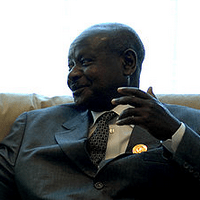KAMPALA, Uganda -- With an estimated 2 billion barrels of oil sitting beneath its Lake Albert, Uganda boasts the largest reserves among a number of African countries whose recent discoveries of petroleum have swelled the ranks of the continent's oil-possessing states. But it took a recently signed agreement resolving a tax dispute between the government of President Yoweri Museveni on one side and two companies -- Tullow Oil and its former partner, Heritage Oil -- on the other to open the door for an estimated $10 billion of investment in the country.
By the terms of the agreement, announced Feb. 15, Tullow will pay $469 million to Uganda over the next month. But while Museveni, recently re-elected after 25 years in power, may crow about the money the country is raking in from its oil even before it is out of the ground, the deal is a hollow victory for Uganda.
Museveni's handling of the dispute demonstrates that he intends to govern the emerging oil industry through secretive presidential dictates rather than independent, transparent institutions, making it unlikely that Uganda will escape the curse that the sector has proved to be in so many other African nations.

